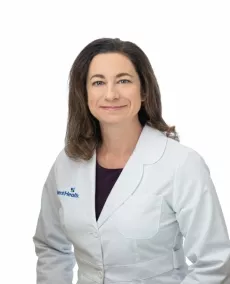- AdventHealth
Choose the health content that’s right for you, and get it delivered right in your inbox.
Every woman will experience menopause at some stage in her life, typically from her 30s to her mid-50s or beyond but obtaining appropriate care can be difficult. Many women find it challenging to obtain accurate information or end up believing widespread misinformation on various social media platforms.
Suzanne Weber, MD, is an OB/GYN at AdventHealth Medical Group OB/GYN at Littleton and sees women with these dilemmas come into her clinic all the time. Dr. Weber has tips for women looking for great menopause care and what to believe and not believe when it comes to hormone therapy.
“To find care, I recommend women start with their own gynecologist, or they can ask their primary care physician to recommend a gynecologist for menopause care,” said Dr. Weber.
One of the common trends that Dr. Weber sees in her clinic with women seeking menopause care involves testosterone pellets. Dr. Weber says they can be effective for many women as long as they are used under proper medical guidance.
“I have some patients that like their pellets. They may have more energy, sex drive. But these are steroids, and they are often in a very high range,” said Dr. Weber.
Unfortunately, many of the women Dr. Weber treats are having side effects from inappropriate pellet dosing.
Some of the women who have negative side effects from the pellets have testosterone levels that are three to ten times normal female levels, and have side effects including male pattern hair loss, hair growth on their face and body, lowered voice and many of these changes are permanent.
For women with menopausal symptoms, Dr. Weber suggests looking into lifestyle adjustments, non-hormonal and hormonal treatments. They can also be screened for other health conditions that may be contributing. Supplements and hormone therapy can be part of the treatment plan after a thorough discussion of risks and potential benefits with their provider.
Dr. Weber suggests that if a woman is having hot flashes, night sweats or genitourinary issues, there is hormone therapy for those symptoms. Hormones may help with sleep independent of hot flashes and joint pain, the main indication for systemic hormone therapy is vasomotor symptoms (hot flashes and night sweats). If a woman treats bothersome night sweats and then she can sleep, she will feel better in other ways, leading to a better mood, more energy, and less brain fog.
If a woman has menopause at age 45 and younger, Dr. Weber believes she should be treated with hormones to reduce her risk of many health conditions like heart disease and dementia.
In general, women with a history of breast cancer, blood clots, stroke, heart disease are not candidates for hormone therapy. Care should always be individualized.
Menopausal hormone therapy is only one small piece of the puzzle. A healthy diet, being physically active, not smoking, and not drinking in excess are the most important steps to take in order to reduce the risk of heart disease, diabetes, cancers, and other health conditions. Also, getting preventive health exams is important (mammograms, colonoscopy, bone density tests, blood work for cholesterol, etc.)
For those looking for menopause treatment, Dr. Weber suggests setting up an appointment separate from a yearly visit to allow thorough discussion.
“Be sure to bring up your top concerns, get appropriate lab testing if indicated, and be informed of evidence-based treatments. We just have to keep trying to get the word out and educating doctors and women,” said Dr. Weber.
You can visit Dr. Weber for treatment here.




